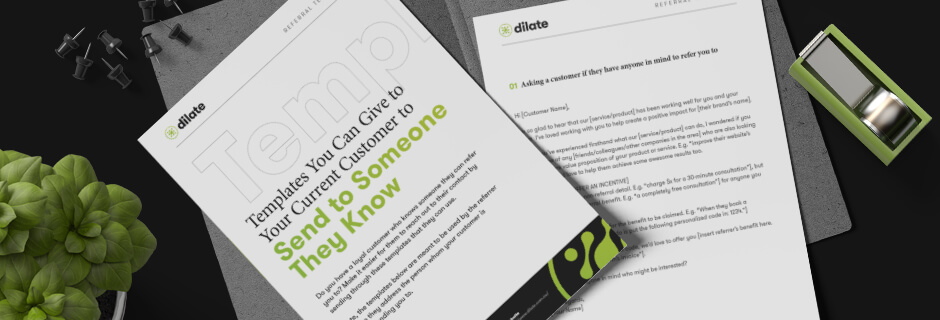

In a world of sophisticated digital marketing, we shouldn’t forget how powerful a simple word-of-mouth referral is. Yes, paid advertising, robust SEO and an excellent website are all important players in helping your business grow, but the effectiveness of a recommendation shouldn’t be overlooked. It’s human nature: we’d rather do business with someone we think is trustworthy than with a total stranger. Asking for referrals can be a tricky art to get right, but once you’ve got an effective strategy in place, it’ll help you attract quality leads, retain more loyal customers and grow your business.
 Client referrals are a cost-effective word-of-mouth way to gain new clients and grow your business. Simply put, a client referral is when you ask previous or existing customers to recommend your product/services to other people in their network. Paired with a robust email marketing strategy, client referrals are really worth your while. Many other types of marketing rely on winning people over who have no previous connection to your business. And while there is certainly a place for this, the referral strategy is all about building on what you’ve got. It takes an asset you already have - good relationships with existing or past clients - and multiplies it. What’s more, referrals are often free (well, if you don’t count all the hard work you put in to give every client an outstanding experience). And they’re effective. Shall we look at some numbers?
Client referrals are a cost-effective word-of-mouth way to gain new clients and grow your business. Simply put, a client referral is when you ask previous or existing customers to recommend your product/services to other people in their network. Paired with a robust email marketing strategy, client referrals are really worth your while. Many other types of marketing rely on winning people over who have no previous connection to your business. And while there is certainly a place for this, the referral strategy is all about building on what you’ve got. It takes an asset you already have - good relationships with existing or past clients - and multiplies it. What’s more, referrals are often free (well, if you don’t count all the hard work you put in to give every client an outstanding experience). And they’re effective. Shall we look at some numbers?
The evidence shows that referrals work. They bring more people to your business, help you retain loyal customers and increase your profits. What’s the magic juice? Why do referrals perform so well? Though it’s a complex web of reasons, there are two key factors that stand out:
 Not all referrals are equal. You want to be getting recommended to the right people - people you want to work with, people who will value what you have to offer. You also don’t want to be putting heaps of effort in and struggling to get any referrals. If you want to have success at getting high quality referrals, you need to ask the right people. Make a list of people you want to ask before you start reaching out; it’s important to be deliberate. Types of clients you could consider asking include:
Not all referrals are equal. You want to be getting recommended to the right people - people you want to work with, people who will value what you have to offer. You also don’t want to be putting heaps of effort in and struggling to get any referrals. If you want to have success at getting high quality referrals, you need to ask the right people. Make a list of people you want to ask before you start reaching out; it’s important to be deliberate. Types of clients you could consider asking include:
Let’s jump into 10 tips for better success when sending that referral email request.

If you want better results, avoid asking for referrals before you’ve shown your clients how valuable your product or service is. Focus on giving them an amazing experience and outstanding results. Blow their expectations out of the water, and then ask if they would refer you. That way they’re less likely to feel as if you’re just using them to get more business. Giving value is one of the best ways to build trust and strengthen client relationships. And the clients who trust and feel connected to you are the ones that are going to recommend you to others.
Do you ask for a referral straight away, wait until a project is over or go for sometime in between? Timing it right can make the difference between getting a referral or not. Basically, you want to ask when your client is still in the highs of how great your product or service is. Have you just received unsolicited praise from a client? That might be a good time. You might also consider asking when a customer has returned to engage your services for a second time or when the first stage of a successful project has been completed. Avoid asking them when they’re thinking about how much money they owe you, such as at the end of a big project. Also avoid asking them too soon, when they haven’t yet experienced the value of your product or service. To find the sweet spot, you might need to experiment a bit. Don’t be afraid to play around with timing, and take note of your results to refine your referral tactics. If you don’t get a response, don’t take it personally, and don’t give up. You may have asked at an inconvenient time or they simply might not know anyone they can refer you to at the moment. Follow up, and you’ll have more success.
It might be tempting to automate and send through a generic referral request to all of your contacts, but if you go the extra mile to be personal, you’ll get better results. Send direct emails or make a phone call instead of bulk messaging everyone. Use a friendly tone and draw on the relationship you’ve already built with the client. Don’t be pushy and avoid sounding desperate. Almost everyone responds better when you make the effort to connect with them on a personal level.
Don’t beat around the bush or word your request vaguely. Get to the point and be specific about what you’re asking for. Instead of asking generally if they would refer you to someone, you might try asking if they know anyone who needs x service or would be interested in y product. Asking this way will help jog their memory, but they might not be able to think of anyone if you make a vague request.
If you’re a little intimidated about asking for referrals, don’t sweat it. After a bit of practice you’ll be much more confident. In the meantime, using client referral letter templates can help get the ball rolling and streamline your referral process. Check out our free templates for client referrals here.
If your client has to jump through hoops in order to refer you, you’re probably not going to have a high success rate. Make it quick and easy for them, and you’re more likely to get results. Here are some ideas for making referrals easier:
Maybe you’ve done everything right from the points above and you’re still struggling to get any referrals. It’s time to create some incentives for your customers. Think about what you could offer them in exchange for a referral. A gift card? A discount? A bottle of wine? Whatever incentive fits right for you, send the offer to your happiest customers. Chances are you’ll start getting a lot more referrals.
If a client takes the time to refer you to someone else, make sure you show them that you appreciate it. Whether you give them a phone call, write them a note or send a personal email, showing appreciation is critical for building trust and encouraging more referrals in the future.
To avoid sending a request out of the blue, make an effort to stay connected to your customers. Building authentic connections with existing and past clients is always a good move. Here are some ideas of how to stay connected:
If you’re asking for referrals but not giving any, it’s time to walk the talk. Help others grow their business by connecting them with your contacts and they’ll be much more likely to return the favour. If you can’t reciprocate by providing specific referrals for your clients, consider sharing their work within your network. For example, is there a blog post of theirs that you can share or can you leave them a positive review? Once you’ve made an effort for them, clients will be more likely to make an effort for you.
 Sometimes the best way to get good at something is by seeing practical examples. Below we’ve put together some referral email templates that work for different situations. Download these and several more templates, make them your own and start reeling in those referrals!
Sometimes the best way to get good at something is by seeing practical examples. Below we’ve put together some referral email templates that work for different situations. Download these and several more templates, make them your own and start reeling in those referrals!
When planning to ask a loyal customer for a referral, focus on them and their happiness. Before you even ask for the referral, make sure that they’re happy with your product/service and consider if there are any ways you could improve their experience. Once you know they’re happy, then gently ask if they know anyone who might be interested in the product/service you provide. You don’t want to make them feel like you’re just there to use them for more business. You want them to feel that you are invested in the relationship. Here’s one way you could do that: Hi [Customer Name], I’m so glad to hear that our [service/product] has been working well for you and your team. I’ve loved working with you to help create a positive impact for [their brand’s name]. Since you’ve experienced firsthand what our [service/product] can do, I wondered if you might know of any other companies in the area who would also benefit from our [product/service]? I would love to help them achieve some awesome results too. Kind regards, [Your Name]
New customers probably haven’t built up the level of trust in you that your long-standing customers have. However, you can still ask them for a referral after they’ve had a positive experience with your service/product. As with longer-standing customers above, seek out your new customer’s feedback before asking for a referral. Ensure that they are happy with your service/product first and then ask for a referral off the back of positive feedback. An example email request could be: Hi [Customer Name], It’s so great to hear that you’ve had a great experience with our [service/product] so far! We’ve been really enjoying working with you to help create a positive impact for [their brand’s name] and I’m confident we’ll see many more good results to come. In the meantime, I wondered if you might know of anyone else who might need help with [problem your product/service solves]? I would love to help them achieve some awesome results too. Best regards, [Your Name]
Are there people in your industry who provide services that complement yours? If you have a good relationship with them, you might be able to open the door to their network. Remember that you’re asking for a favour, so be prepared to reciprocate and offer your own referrals. Again, your focus should be on adding value to potential clients. If your contact recommends you and you do a great job, it will also build the client’s trust in them. Here’s how you could approach this one: Hi [Contact’s Name], I just wanted to stop by and say [their company name] has been doing an amazing job lately. We’ve had a few clients recently who also work with [their company name] and have seen some great results with [main service/product they offer]. I think that what [their company name] and [your company name] have to offer makes a pretty powerful combination. I have a few other clients that might be interested in your [their product/service], and could point them your way if you’re interested? If you know any clients who would also benefit from [your product/service], would you consider sending them our way? I’d love to help them out. Kind regards, [Your Name]
It might seem counter intuitive, but in some industries your competitors might be able to give you some quality referrals. This is especially true for industries with large markets where competitors may specialise in slightly different client bases. For example, let’s say you’re a wedding photographer that specialises in intimate weddings and elopements. If a couple comes to you, enquiring about photography for a large wedding, you might consider referring them onto another wedding photographer who specialises in this. What’s more, a couple might come to you for an elopement, but you’re already booked for that day. Instead of sending them away empty handed, you might refer them to another elopement photographer you know will do a good job. When asking for a referral from competitors, you could approach it like this: Hi [Competitor’s Name], I just wanted to send a quick email to say that I really admire the work you do in [type of work/niche]. Recently, I’ve been getting more enquiries in that area but I’m having to turn them down because at [your company name] our focus is more on [your type of work/niche]. Would you be interested in me sending any future enquiries of that nature in your direction? I’d be more than happy to do so because even though our focus is different, I feel that [their company name] and [your company name] have a similar ethic that clients would be attracted to. If you have any overflow of enquiries for [your type of work/ niche], would you consider sending them my way? Looking forward to hearing from you soon, [Your Name]
So you’ve sent off a well-worded and well-timed referral request and you get a positive reply. Now what? You want to make it as easy as possible for that person to follow through with the referral. A great strategy is to send them a client referral form template that they can use to send on to their contacts. That way they won’t have to spend time composing an email. They can simply customise the template and send it off to your potential next client! Here’s an example of a template you could send to someone who has agreed to refer you: Hi [Referral], I wanted to drop you a quick email to put you in touch with [Your Name]. I’ve been working with [Your Name] on [type of work/service] and thought their services might be of use to you too. [Your Name] provides [type of work/service.], and I’ve been really impressed with their [results you have achieved for the referrer]. I’ve cc’ed [Your Name] so you can get in touch if you think they're a good fit for you. Check out their website here [link to your website]. Let me know if you have any questions, otherwise I’ll let you two take it from here. Best Regards, [Referrer]
Once your efforts pay off and you get your happy ending, don’t forget to show your appreciation. Afterall, the referrer took time out of their schedule to recommend you. Taking time out of your schedule to thank them will help solidify their trust in you and might open the door to more referrals in the future. You might also consider offering them something for referring a new customer to you. Whether that’s a discount on their next invoice, a gift voucher or a bottle of wine, even a small gesture of gratitude will go a long way. Here’s an email template for thanking your referrers: Hi [Referrer], A huge thank you for referring [Referral Name] to me! It means so much that you were happy with the work we did that you shared [Your Business Name] with someone else. I really appreciate that you took the time to do that and I’m excited to have the opportunity to help [Referral Name] with [your service/work]. [IF APPLICABLE] As a thank you, I’d love to take 10% off your invoice for next month. With gratitude, [Your Name]
 The impact of referrals shouldn’t be underestimated. If it’s not already part of your email marketing strategy, now is a great time to start reaching out to your happiest customers. If you’re not sure how to get started or need a helping hand to set up marketing strategies that actually work, we’d be happy to help. At Dilate, we offer digital and email marketing services to help businesses grow and thrive. Get in touch with us to see what we can do for you.
The impact of referrals shouldn’t be underestimated. If it’s not already part of your email marketing strategy, now is a great time to start reaching out to your happiest customers. If you’re not sure how to get started or need a helping hand to set up marketing strategies that actually work, we’d be happy to help. At Dilate, we offer digital and email marketing services to help businesses grow and thrive. Get in touch with us to see what we can do for you.
what our clients are saying
create business. better everyday.
Let's Talklearn from the best minds in the business
Bodie provides some insight into Dilate's internal operations. How we approach what we do, and how we strive to be Better Everyday.

"*" indicates required fields
"*" indicates required fields


